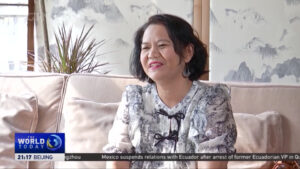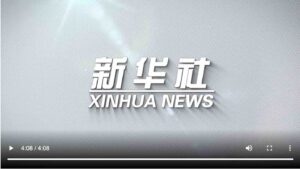It was an exciting panel discussion with Ms. Liu Xin, Prof. Victor Gao, and another academic on Japan’s recently released 2023 Defence White Paper this morning on CGTN’s flagship program, – The Point!
To watch the replay, click this link: https://www.cgtn.com/tv/replay?id=BGCDBEA
Aside from what I have spoken earlier, here’s some of my impression of Japan’s 2023 Defence White Paper…
The 2023 Defence White Paper of Japan is a mirror image of the National Defense Strategy (NDS) of the United States. It is modeled after US NDS. This signals that Japan is synchronizing its defense and military strategies and projections with that of the US. Hence, Japan is deepening its defense and military alignment and alliance with the US as its most important military and security partner and ally.
Japan’s 2023 white paper talks about deterrence vis-à-vis the fictional and imaginary “China Treat,” justifying their military expansionism in the Asia/Indo-Pacific region and Japan’s re-arming through developing its counter-attack capability, increased defense spending, and procurement plan and build-up of military capabilities.
Also, Japan’s white paper has singled out China, Russia, and even North Korea as security challenges/threats to Japan’s security. Specifically, the white paper identified China as “an unprecedented and the greatest strategic challenge.” Nevertheless, it is evident that the new security and military trajectory of Japan, as reflected in its 2023 Defence White Paper, is aimed at countering China’s military modernization, growing political influence among countries in Asia and even beyond, and China’s peaceful rise as the dominant power in Asia displacing Japan to a considerable extent.
Regarding how the Japanese government’s latest defense and security strategy will impact the region, first, the said white paper could provoke an arms race which is an anathema to sustaining peace, stability, and security in the Asia Pacific region. Second, it may create divisions among Asian countries and escalate tensions in the already tension-driven Indo-Pacific region. These are just a few of the possible ramifications of Japan’s re-arming.
On the other hand, mentioning the Taiwan issue in Japan’s defense white paper is somewhat an “over the top” move and a political grandstanding on the part of the Japanese government. The Taiwan issue is an internal matter of China. It is an established fact that Taiwan is, inalienable part, a renegade province of China. Thus, countries that claim to adhere to and respect the One-China policy should be more sensitive and prudent not to touch on one of China’s red flags to avoid any further tensions in the region. Countries like Japan and the US should respect the internal affairs of another state, in this case, China’s internal affairs. They should not meddle in the Taiwan question and let Taiwan and China resolve their differences devoid of any internal interference from third parties. Only this way will the Taiwan Strait’s peace, stability, and security be ensured.
On this note, I hope the Japanese government will rethink its 2023 Defence White Paper to be more reflective of what should constitute peace, security, and stability in the Asia Pacific region Instead of provoking an arms race and singling out countries that are not subservient to the will of its allied superpower, – the United States, for the sake of Asian unity, prosperity, and peaceful co-existence.
Video Link: https://www.cgtn.com/tv/replay?id=BGCDBEA



